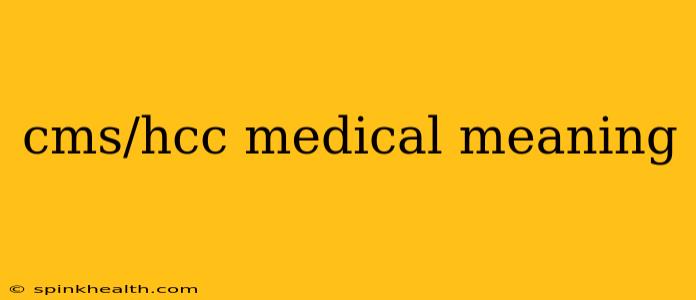The terms "CMS" and "HCC" are frequently encountered in the healthcare industry, often causing confusion for those outside the field. Let's unravel their meanings and explore their significance in medical billing and reimbursement. This journey starts with a story...
Imagine Sarah, a diligent coder at a bustling medical clinic. She's faced with a mountain of patient records, each requiring meticulous coding to ensure accurate billing and reimbursement from insurance providers. Central to her work are two crucial acronyms: CMS and HCC. Understanding them is key to her – and every healthcare professional's – success.
What does CMS stand for in medical billing?
CMS, in the context of medical billing, stands for the Centers for Medicare & Medicaid Services. This is a federal agency within the U.S. Department of Health and Human Services. The CMS is responsible for administering the Medicare program, the Medicaid program, and the Children's Health Insurance Program (CHIP). Essentially, they're the gatekeepers, setting the rules and regulations for how healthcare providers get paid for the services they deliver. They develop the coding systems, and ultimately, decide how much insurance companies pay for specific diagnoses and procedures. Think of them as the rule-makers for the entire healthcare finance system.
What are HCC codes?
HCCs, or Hierarchical Condition Categories, are a risk adjustment model used by CMS to determine the relative health status of Medicare Advantage (MA) beneficiaries. These codes are not directly used for billing individual services. Instead, they are used to categorize diagnoses into clinically meaningful groups, reflecting the complexity and cost of expected healthcare needs. The more complex a patient's health conditions, as reflected by the HCC codes assigned, the higher the reimbursement the MA plan receives from CMS. This model aims to fairly compensate plans based on the health status of their enrollees. It helps level the playing field so plans with sicker populations aren't at a financial disadvantage.
Think of HCCs as a sophisticated scoring system. The higher the score, the more complex a patient’s medical picture, and the more resources—and thus reimbursement—the healthcare system anticipates needing. This ensures that plans aren't unfairly penalized for taking on patients with more complex needs.
What is the difference between ICD codes and HCC codes?
This is a frequently asked question, and a crucial distinction to understand. ICD codes (International Classification of Diseases) are used for diagnostic coding, directly applied to individual diagnoses during patient encounters. They’re used for billing, for tracking disease prevalence, and for public health purposes. HCCs, on the other hand, are derived from ICD codes. They group multiple ICD codes into broader categories representing similar levels of healthcare resource utilization. ICD codes are the individual bricks; HCCs are the walls built from those bricks.
How are HCC codes assigned?
HCC codes are not assigned by individual physicians during a patient visit. Instead, they are typically assigned by a specialized coding staff after reviewing the patient's complete medical record, including all diagnoses, procedures, and other relevant clinical information. This process requires a deep understanding of both medical terminology and the HCC coding system itself. The accuracy of HCC assignment is critical for fair and appropriate reimbursement to Medicare Advantage plans.
Why are HCC codes important?
HCCs play a crucial role in ensuring fair reimbursement to healthcare providers, particularly in the context of Medicare Advantage plans. They are instrumental in risk adjustment, reflecting the complexity of a patient's condition, and therefore impacting the amount of funds the plan receives to care for that individual. This system aims to promote equitable distribution of resources across plans, ensuring that those with higher-risk patients are appropriately compensated for their efforts.
What are the potential consequences of inaccurate HCC coding?
Inaccurate HCC coding can have significant financial consequences, both for healthcare providers and Medicare Advantage plans. Undercoding can lead to underpayment, while overcoding can result in penalties and audits. Accurate HCC coding is therefore paramount for maintaining financial stability and compliance with CMS regulations. This is where Sarah's expertise as a coder is invaluable.
Sarah's daily work, filled with the intricacies of CMS and HCCs, demonstrates the vital link between medical coding, accurate reimbursement, and the overall health of the healthcare system. The precision demanded emphasizes the crucial role of trained professionals in navigating this complex landscape.

